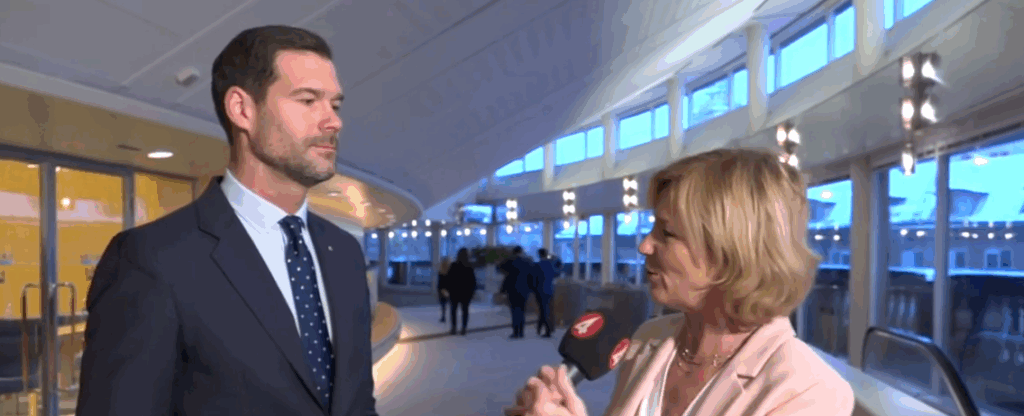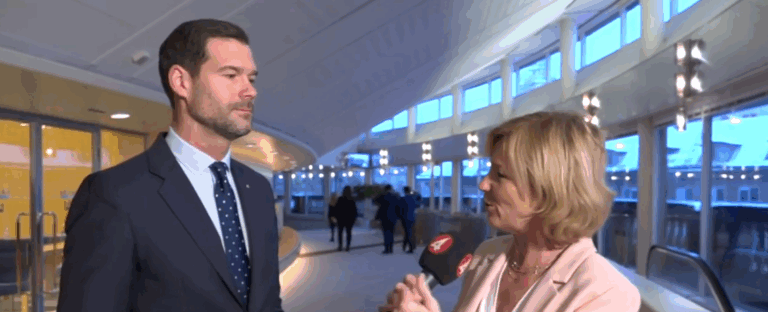A story that left the private sphere of a family and entered the public eye has rocked Sweden’s political landscape in recent days. Senior minister and ardent supporter of robust anti-extremist legislation Johan Forssell expressed his profound regret over his teenage son’s involvement with far-right organizations on the internet. The disclosure has sparked a national conversation about parenting, online dangers, and the fine line separating personal tragedy from political duty.
Forssell has influenced national discussions on youth crime and digital extremism for a long time by using his position within the Moderate Party. Ironically, his own family was subtly experiencing the very threats he had warned about. Expo, an anti-racism watchdog, identified his 16-year-old son—who will not be named for legal reasons—as a “close relative” of a prominent politician who has ties to neo-Nazi organizations. The Swedish public was taken aback by the connection, which quickly became a media sensation.
It wasn’t until Säpo, Sweden’s security agency, contacted Forssell that he learned of the situation. His son had followed and interacted with well-known extremists on social media, where he was particularly active. Forssell acknowledged that even though he kept up with his son’s online activities, he was unaware of the more profound digital entanglements. The story is remarkably similar to an increasing number of parental accounts around the world, where children’s online behavior deviates greatly from what is initially apparent.
Johan Forssell – Bio Data and Key Information
| Full Name | Carl Johan Henrik Forssell |
|---|---|
| Date of Birth | December 8, 1979 |
| Nationality | Swedish |
| Current Position | Minister for Migration and Asylum Policy |
| Political Party | Moderate Party (Centre-right) |
| Years Active in Politics | Since early 2000s |
| Controversy Involved | Teenage son linked to far-right extremist groups |
| Family | Married, with children (including teenage son) |
| Reference Link | BBC News on Forssell’s son |

Forssell wanted to assume responsibility by speaking out, but not as a minister but as a father. It has nothing to do with me as a politician. “It’s about safeguarding a minor,” he posted on social media. With his statement, he came across as sympathetic rather than defensive—a parent who is unaware of the very algorithms and echo chambers influencing today’s youth.
Given that Forssell had recently argued for lowering Sweden’s age of criminal responsibility from 15 to 14, the incident has generated intense debate. Critics now contend that he is advocating harsh laws for others while being lenient with his own family. The Left Party’s Tony Haddou called the situation “glaring hypocrisy,” claiming that Forssell’s previous statements about juvenile crime are incoherent when compared to what his son has done.
However, this episode exposes an unsettling reality in the context of digital radicalization: extremist networks are changing incredibly precisely. Far-right recruiters are increasingly integrating their narratives into fitness forums, private chats, and pseudo-political youth collectives, according to renowned terrorism analyst Dr. Magnus Ranstorp. These strategies work especially well at attracting teenagers who are looking for a sense of identity and community, particularly in digitally overstimulated settings where voicing outrage is frequently rewarded with attention.
Forssell unwittingly made his son a case study of national vulnerability by emphasizing the extent of this change. Diverse recruitment strategies are taking advantage of weaknesses in digital parenting. Even though Forssell maintains that his son is “deeply remorseful” and has since cut off all contact with extremists, the incident will probably always cast a shadow over his political and personal identities.
This is a reckoning for Swedish society, not just a scandal. What does it say about the readiness of typical families that someone as politically active and security-conscious as Forssell could be oblivious to his son’s slide into ideological extremism? The event emphasizes how crucial proactive digital literacy is for both teens and their parents. Families may build barriers against manipulative online tactics by having “long and important conversations,” as Forssell explained. However, the fact is that many parents are not prepared to recognize these digital cues at an early age.
Forssell was defended by Prime Minister Ulf Kristersson, who said that he had reacted “as a responsible parent should.” Opposition voices, however, are demanding that he appear before Parliament following the summer break. This might be more than a minor political dispute. Already under fire for its collaboration with the Sweden Democrats, the Moderate-led coalition is coming under increased scrutiny for its conflicting statements on extremism.
In order to combat political violence, Sweden has seen a marked improvement in coordination between NGOs and authorities over the last ten years. However, extremism focused on young people has developed more quickly than laws. To appeal to teenagers, far-right organizations now emphasize charisma, physicality, and meme-based language. They repackage hate into aspirational content by manipulating it strategically. This complicates both detection and rehabilitation.
Forssell’s answer, albeit flawed, provides a foundation for more extensive public discourse by highlighting parental involvement and communication. Unquestionably, the situation is tragic, but it also brings attention to an epidemic that many families are unaware they are dealing with. The need for resources that give parents a better understanding of the subtle radicalization trends that are appearing online has significantly increased.
Forssell’s public position may still be questioned by some, but the real lesson is the vulnerability this story has revealed. Generational and emotional divides in addition to political vulnerability. For thousands of parents who struggle to keep an eye on their kids’ digital lives, the idea that a minister could so completely miss signs at home is not only ironic, but also painfully relatable.
A more extensive youth monitoring program involving schools, digital literacy campaigns, and possibly legislative updates will be introduced in Sweden in the upcoming months. Despite the political repercussions, Forssell might unintentionally represent the pressing need to reevaluate how society safeguards its children.
Despite the obvious distress this chapter has caused, it also makes room for something more potent: accountability, transparency, and reform. Personal crises have occasionally led to legislative change in the longer history of public service. This incident has the potential to change Sweden’s anti-extremist strategy to one that is both human-centered and policy-driven if it is handled well.


